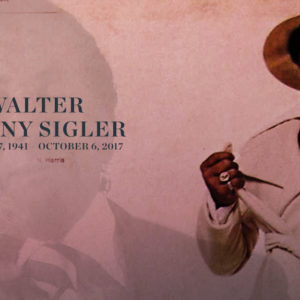We’ve had a firsthand view of the MacArthur Foundation “Genius Grant” process after Kellie Jones was awarded the prize last year for her decades of curatorial and historical work. The foundation lists three criteria for selection: “exceptional creativity, promise for important future advances based on a track record of significant accomplishment, and potential for the fellowship to facilitate subsequent creative work.”
This year’s cohort includes a number of scholars, thinkers, and creative workers whose contributions span disciplines and the globe. We thought we’d highlight a few of them, who see their hard work recognized with this important grant.
Dawoud Bey – Photographer
“Dawoud Bey is a photographer and educator whose portraits of people, many from marginalized communities, compel viewers to consider the reality of the subjects’ own social presence and histories,” the MacArthur Foundation site writes. “Through his expansive approach to photography—which includes deep engagement with his subjects and museum-based projects—Bey is making institutional spaces more accessible to the communities in which they are situated.” This manifests specifically in photographs of teens, often from marginalized communities. An important recent work, The Birmingham Project (2013), commemorated the lives of the six children killed in the 1963 bombing of the Sixteenth Street Baptist Church in Alabama by photographing Birmingham youth who were the same age as those killed during the bombing. His work uses photography to tell stories about communities from new angles.
Rhiannon Giddens – Musician, Songwriter, Historian
Giddens’s activist musical output reclaims genre forms including folk and country by illustrating and performing their connections to African American history and wider black music-making practice. As a member of Carolina Chocolate Drops, she performs folk music inflected by black history and tradition; and her most recent solo album, Freedom Highway (2017), connects the present to the slave-era past through music. Drawing inspiration from slave narratives, early twentieth-century songwriters such as Mississippi John Hurt, and even a rap about police violence written by her nephew, Freedom Highway is at once a recuperation of suppressed voices and a history lesson,” the MacArthur Foundation writes. “Giddens’s drive to understand and convey the nuances, complexities, and interrelationships between musical traditions is enhancing our musical present with a wealth of sounds and textures from the past.”
Nikole Hannah-Jones – Journalist
As a writer for The New York Times Magazine and the co-founder of the Ida B. Wells Society for Investigative Reporting, Hannah-Jones is an investigative journalist whose work emphasizes the difficulties, failures, and ongoing frictions of racial integration throughout the United States. Her work such as the This American Life program telling the story of Michael Brown’s high school near Ferguson, MO, and her own account of school search in New York City (“Choosing a School for My Daughter in a Segregated City”) report and shed light onto the persistent inequities in the nation. “She combines analyses of historical, academic, and policy research with moving personal narratives to bring into sharp relief a problem that many are unwilling to acknowledge still exists and its tragic consequences for African American individuals, families, and communities,” the MacArthur Foundation writes.
Jesmyn Ward – Fiction Writer
Ward’s fiction writing focuses on blacks in the rural South, specifically Mississippi’s Gulf Coast. Her most recent, Sing, Unburied, Sing (2017), explores a black family’s drives across the state, engaging with impact of the pasts and presents of the Southern black experience of her and others like her. Her previous novel, Salvage the Bones (2011), dealt with the lead-up to and immediate fallout from Hurricane Katrina on the gulf. These marginalized communities, she suggests, deserve to have their stories told. “In her novels and nonfiction accounts of her own experiences with loss and injustice, Ward is offering a raw and powerful portrayal of the circumscribed possibilities and lost potential faced by many African Americans after generations of racial and economic inequality,” the MacArthur Foundation writes.

 Share On Facebook
Share On Facebook Tweet It
Tweet It




